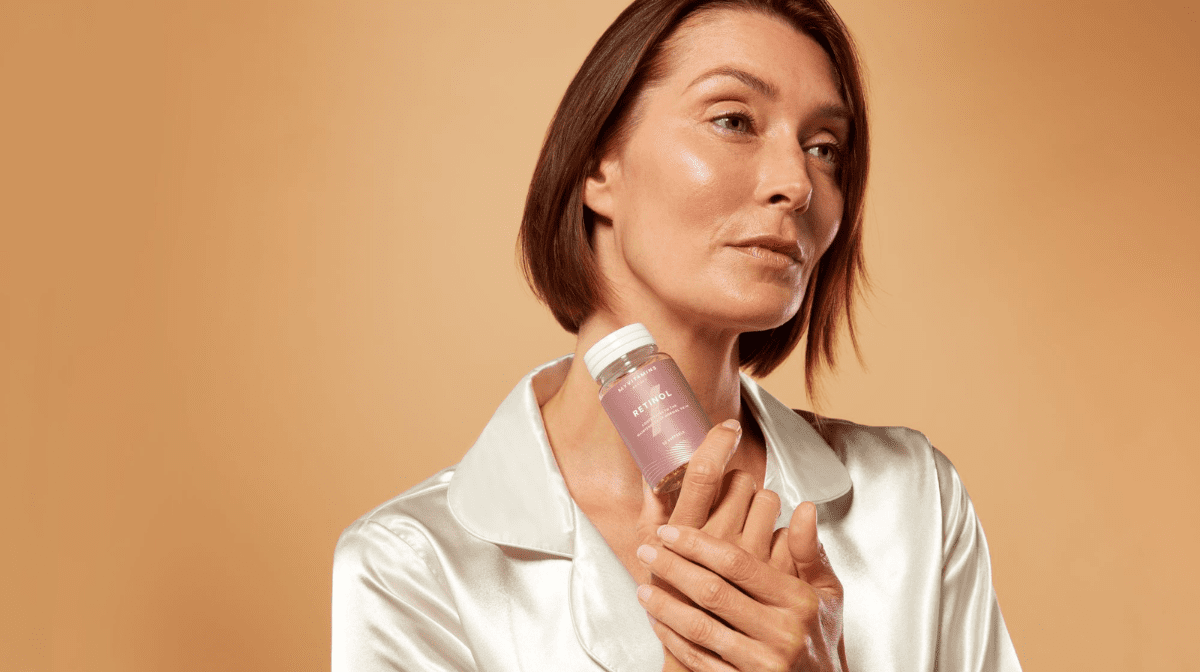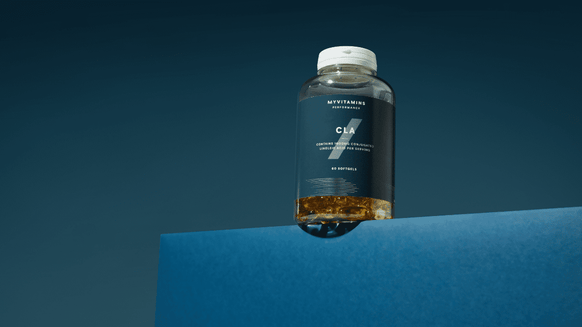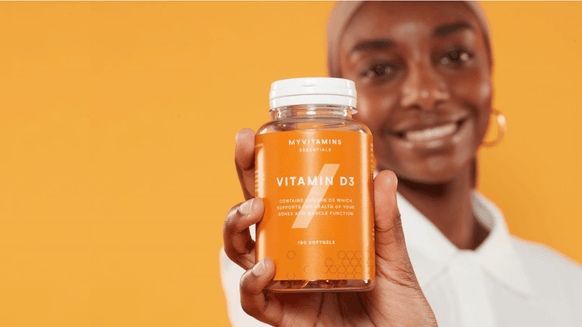What Is Vitamin A: Everything You Need To Know

The uses of vitamin A are less well known than other vitamins – however, ‘retinoids’ and ‘retinoic acid’ are commonly used skincare products that are actually derived from vitamin A! Keep reading to find out more about the sources and uses of vitamin A.
- What Is Vitamin A?
- What Does Vitamin A Do?
- Vitamin A Benefits
- How Much Vitamin A Do We Need?
- Vitamin A Side Effects
- How To Take Vitamin A Supplements
- Vitamin A Food Sources
What Is Vitamin A?
Vitamin A is a fat-soluble vitamin that is considered to be an ‘essential’ nutrient; this means it has to be obtained via dietary sources. Being fat-soluble, Vitamin A requires a certain amount of dietary fat in order to be utilised and stored effectively.
Vitamin A can be found in animal products in the form of retinol and retinyl esters, which the body can use immediately. A precursor to vitamin A – provitamin A carotenoids – can be found in plant sources. The body naturally converts this into a usable form of vitamin A.
What Does Vitamin A Do?
Vitamin A has a whole host of functions within the body including immunity support, eye health, cell generation, and skin health. Vitamin A interacts with both short and long-term immune systems, providing extra support against infection. Vitamin A also plays a role in cellular differentiation which can have a variety of benefits; most commonly, vitamin A supplementation is used for the treatment of acne and other inflammatory skin conditions.
Vitamin A Benefits
Vitamin A is vital to many intracellular processes, including cell signalling. In fact, it has its own signalling pathways which use Retinoic acid Receptors and Cellular Retinoic Acid Binding Proteins. Let’s explore how these proteins and receptors are used beneficially.
Benefit 1: Immune system support
Vitamin A is needed for the development of macrophages, a type of immune cell that capture and invading organisms. This first-line defence process can cause inflammation as part of the immune functioning. However, vitamin A helps to fight this inflammation by promoting formation of anti-inflammatory macrophages
Benefit 2: Help reduce inflammation
Vitamin A, in the form of Isotretinoin (13-cis-retinoic acid) is used for the treatment of moderate-severe acne. It works by inhibiting the oil producing glands, that when blocked, cause acne. Vitamin A also blocks the proliferation of acne causing bacteria that live on the skin
Benefit 3: Anti-ageing properties
Vitamin A stimulates the production of collagen and elastin; both of which are integral to healthy, youthful looking skin. Both collagen and elastin are needed to maintain hydration of skin and reduce the appearance of fine lines and wrinkles
Benefit 4: Maintenance of vision and eye health
Vitamin A has two functions when it comes to eye health. Firstly, vitamin A is needed for production of new cells to maintain the protective mucosal layer of the eye. Secondly, vitamin A acts as a precursor for the pigments in the eye that recognise both colour and light; a deficiency of vitamin A can lead to difficulty with vision in dim light
Benefit 5: Support the gut microbiome
The main function of vitamin A is to aid in cell proliferation and turnover. This extends to our gut microbiome. Vitamin A helps to maintain the mucosal layers of our gut. This prevents pro-inflammatory leakage from our gut and helps to increase the number of ‘good bacteria’ that form the microbiome
How Much Vitamin A Do We Need?
An adult male requires around 700 micrograms of Vitamin A, whilst adult females require around 600 micrograms. Vitamin A content is usually written as ‘micrograms (g) of retinal equivalents (RE)
Vitamin A Side Effects
As vitamin A is a fat-soluble vitamin, any excess is stored within the liver or other tissues. This can lead to a build-up of vitamin A within the body and increase the risk of side-effects.
Increased Risk of Osteoporosis
Post-menopausal women and the elderly population are already at an increased risk of bone thinning. Too much vitamin A can hasten this process, leading to osteoporosis
Sun Sensitivity.
Increased sensitivity to sunlight is a known side effect of tretinoin treatment for acne. However, it can also occur with vitamin A supplementation or topical vitamin A use. Additional SPF use may be helpful if supplementing with vitamin A.
Skin Changes
A diet high in plant-based sources of vitamin A can lead to an orange-yellow tint to the skin. This is due to not all of the brightly coloured pigment being converted into vitamin A – excess pigment circulates in the blood, causing skin discolouration.
Muscle Aches and Pains
An excess of vitamin A can lead to general symptoms of feeling unwell. These can include muscle and joint aches/pain, dry skin, dizziness, and headaches. However, these symptoms tend to be as a result of an incredibly high dose, often taken over a long period of time
How To Take Vitamin A Supplements
It is recommended that both men and women have no more than 1.5mg of vitamin A per day, from both food and supplement sources Please consult your GP or other healthcare professional prior to starting supplementation with vitamin A, especially if trying to conceive.
Vitamin A Food Sources
Animal foods are a fantastic, ready-to-use source of vitamin A. Alternatively, plant-based foods contain the pre-cursor form which the body converts to vitamin A. Look for brightly coloured fruit and vegetables, as these are often high in vitamin A.
Food sources of vitamin A include:
- Beef/chicken liver
- Sweet potato
- Spinach
- Carrots
- Milk
- Peppers
- Mangos
- Fortified breakfast cereals
- Eggs
- Dried apricots
- Broccoli
- Tomatoes
Talk To Your Doctor
This article is for educational purposes only and should not be used as a substitute for medical advice. If you have any concerns about your health, please contact your GP or other relevant healthcare professional.
Take Home Message
In summary, there are many benefits to vitamin A; improved skin and gut health, reduced inflammation and improved immunity and eye health. However, over-consumption of vitamin A can lead to side effects, and particular groups of people should be mindful about supplementing with this vitamin.
FAQs
What is vitamin A and what does it do?
Vitamin A is an essential vitamin that is used in many cellular processes. Most well-known are it’s anti-inflammatory and immune-boosting properties.
What is vitamin A good for?
Vitamin A is particularly useful for eye health and skin health. It has long been used as a treatment for inflammatory skin conditions such as acne.
What foods have vitamin A?
Brightly coloured fruit and vegetables contain the pre-cursor to vitamin A. Examples include sweet potato, peppers, and tomatoes. Animal-based sources of vitamin A include liver, eggs, and dairy products.
Is it OK to take vitamin A every day?
It is recommended to take no more than 1.5mg of vitamin A per day. However, the recommended amounts are lower in certain conditions such as pregnancy.
Is vitamin A better taken at night or in the morning?
Vitamin A can cause sun sensitivity, especially when used topically or in large doses. For this reason, it is recommended to take vitamin A containing products in the evening.









